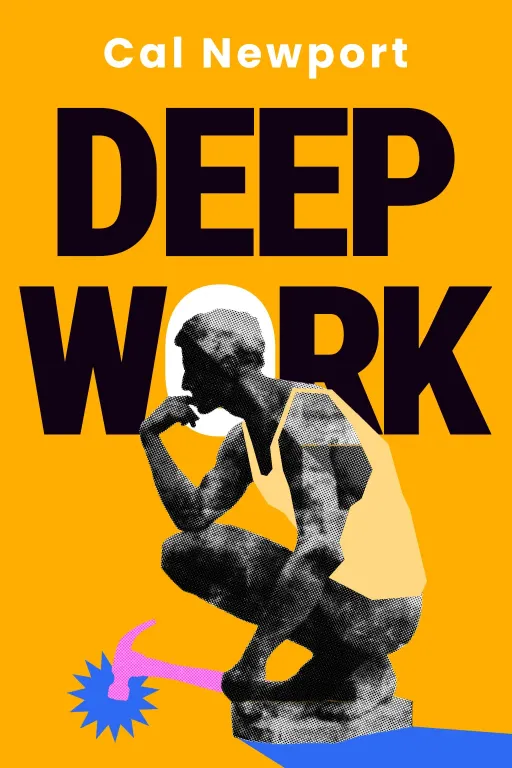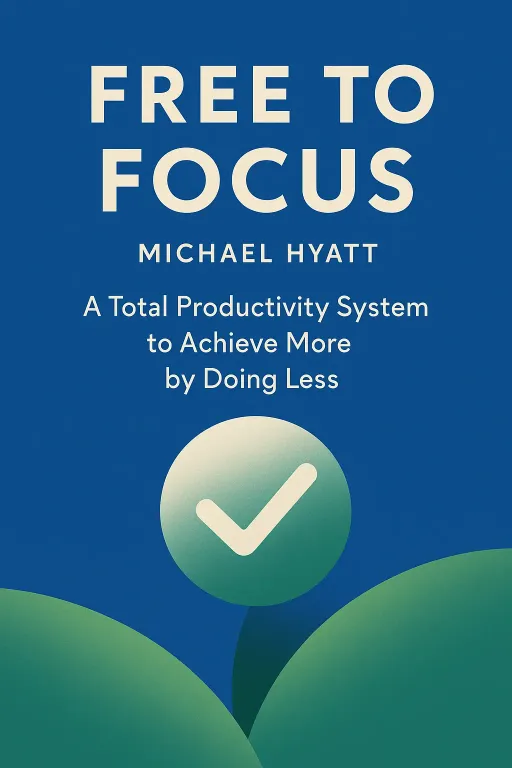
Deep Work
10 minRules for Focused Success in a Distracted World
Introduction
Narrator: In 1922, the renowned psychiatrist Carl Jung began building a retreat for himself in the quiet village of Bollingen, Switzerland. He started with a simple, two-story stone house he called the Tower. It had no electricity or running water. Here, away from the demands of his busy clinical practice in Zurich, Jung followed a strict daily ritual. He would rise early, spend hours writing in complete solitude, and then dedicate his afternoons to meditation and long walks in the surrounding woods. This isolated tower was not an escape from work; it was an escape to work—the kind of profound, focused work that allowed him to develop the theories that would change psychology forever.
This deliberate retreat from distraction stands in stark contrast to the modern professional's reality, a world defined by a constant barrage of emails, notifications, and open-plan offices that make concentration feel like a luxury. In his book Deep Work: Rules for Focused Success in a Distracted World, author Cal Newport argues that the ability to do what Jung did—to focus without distraction on a cognitively demanding task—is becoming one of the rarest and most valuable skills in our economy. The book serves as a guide to reclaiming this lost art, providing a compelling case and a practical framework for thriving in an increasingly distracted world.
The Deep Work Hypothesis: A Rare Skill in a Distracted Economy
Key Insight 1
Narrator: Newport begins by establishing a critical distinction between two types of work: deep work and shallow work. He defines deep work as professional activities performed in a state of distraction-free concentration that push cognitive capabilities to their limit. These efforts create new value, improve skills, and are hard to replicate. In contrast, shallow work consists of non-cognitively demanding, logistical-style tasks, often performed while distracted. These efforts, like answering emails or attending status meetings, tend not to create much new value and are easy to replicate.
The central argument of the book, which Newport calls the Deep Work Hypothesis, is that the ability to perform deep work is becoming increasingly rare at the exact same time it is becoming increasingly valuable. The modern workplace, with its emphasis on constant connectivity and collaboration, actively encourages shallow work. A 2012 McKinsey study found that the average knowledge worker spends over 60 percent of their week engaged in electronic communication and internet searching. This culture of busyness, where responding quickly is often mistaken for being productive, erodes our capacity for sustained focus. As this skill becomes scarcer, the few who cultivate it and make it the core of their working life will gain a significant competitive advantage and thrive.
The Two Superpowers of the New Economy
Key Insight 2
Narrator: Deep work is not just a pleasant state to be in; it is the engine behind two core abilities essential for success in the 21st-century economy: the ability to quickly master hard things and the ability to produce at an elite level. In a world of rapid technological change, the capacity to learn complex skills is a prerequisite for staying relevant. Newport argues that deep work is the key to this mastery. Intense, uninterrupted concentration is precisely what’s needed to rewire neural pathways and strengthen skills, a process known as deliberate practice.
This is powerfully illustrated by the story of Jason Benn, a financial consultant who realized his job could be automated by a simple script. To build a more valuable career, he decided to become a computer programmer. After quitting his job, he locked himself in a room with only textbooks and notecards, eliminating all digital distractions. This intense, deep study allowed him to master the fundamentals before attending a coding bootcamp, where he excelled and ultimately landed a high-paying developer job. He didn't just learn a skill; he learned it deeply and quickly. The second ability, producing at an elite level, is a function of both time and intensity. As Wharton professor Adam Grant’s prolific academic output shows, batching work into long, uninterrupted stretches minimizes "attention residue"—the lingering thoughts from a previous task—and maximizes the quality of output.
Choosing a Philosophy for Deep Work
Key Insight 3
Narrator: Newport argues that good intentions are not enough to build a deep work habit. Relying on willpower to resist distraction is a losing strategy because willpower is a finite resource. Instead, he proposes that individuals must choose a clear philosophy for integrating deep work into their lives. He outlines four distinct approaches.
The Monastic Philosophy involves radically minimizing or eliminating shallow obligations. This is the path of figures like science fiction author Neal Stephenson, who avoids email and public appearances to protect long, uninterrupted chunks of time for writing. The Bimodal Philosophy, famously practiced by Carl Jung, involves dividing your time into clearly defined stretches. For Jung, this meant spending dedicated periods in deep focus at his Bollingen Tower, while the rest of his time was open to his clinical practice and social life in Zurich. The Rhythmic Philosophy transforms deep work into a simple, regular habit, like Jerry Seinfeld’s method of writing jokes every single day to "not break the chain." Finally, the Journalistic Philosophy is for those who can fit deep work into any unexpected free moment in their day, a skill that requires significant practice but allows for great flexibility. The key is not which philosophy one chooses, but that one chooses a system to make deep work a non-negotiable part of their routine.
Execution is Everything: Rituals, Scoreboards, and Shutdowns
Key Insight 4
Narrator: Beyond a high-level philosophy, deep work requires a system of execution. Newport adapts a business framework called The 4 Disciplines of Execution (4DX) for personal productivity. This involves focusing on a "wildly important" goal, acting on "lead measures" (like hours spent in deep work), keeping a "compelling scoreboard" to track progress, and creating a "cadence of accountability" through regular reviews. Keeping a simple tally of deep work hours on a visible scoreboard, for instance, creates a powerful feedback loop that fuels motivation.
Perhaps one of the most critical rituals is the shutdown at the end of the day. To truly benefit from downtime, which is essential for insight and recharging energy, the brain must completely disengage from work. A shutdown ritual—such as reviewing tasks, making a plan for the next day, and saying a phrase like "shutdown complete"—signals to the brain that it's safe to stop thinking about work. This practice helps overcome the Zeigarnik effect, where incomplete tasks dominate your thoughts, and allows for genuine rest, making the next day's deep work sessions more effective.
Embrace Boredom and Drain the Shallows
Key Insight 5
Narrator: Cultivating deep work isn't just about scheduling; it's about training the mind to resist distraction. Newport argues that if you spend your free time constantly seeking novel stimuli online, you are wiring your brain for distraction, making it impossible to focus when it matters. The solution is to "embrace boredom." Instead of taking breaks from distraction, he advises taking breaks from focus. This means scheduling your internet and social media use in specific blocks and avoiding it entirely outside those times.
This principle of intensity is powerfully illustrated by the study habits of a young Theodore Roosevelt at Harvard. Despite a schedule packed with extracurriculars, he achieved honor grades by studying with blistering intensity in the short, fragmented periods he had available. To drain the shallows from our own lives, Newport suggests adopting a "craftsman approach" to tools. Instead of using a tool for "any benefit" it might offer, we should only adopt tools whose positive impacts on our core goals substantially outweigh their negative impacts. This requires ruthlessly identifying and culling shallow activities to make room for the deep efforts that truly matter.
Conclusion
Narrator: Ultimately, Cal Newport's Deep Work is more than a productivity guide; it's a call for a more intentional and meaningful way of living and working. The book's single most important takeaway is that a commitment to depth is not an elitist, Luddite rejection of the modern world, but a pragmatic strategy for producing real value and finding fulfillment. In an economy that increasingly rewards those who can create, innovate, and master complexity, the ability to focus is a superpower.
The challenge, therefore, is not to abandon technology or collaboration, but to become a craftsman in their use—to deliberately choose what deserves our time and attention. The final question the book leaves us with is this: What is one tool, habit, or workflow you engage with daily, and does it truly serve your deepest goals, or does it merely offer a fleeting, shallow benefit that costs you more than you realize? Answering that question honestly is the first step toward a deeper, more productive, and more meaningful life.









